-
 Bitcoin
Bitcoin $82,939.8540
-1.12% -
 Ethereum
Ethereum $1,790.1968
-1.04% -
 Tether USDt
Tether USDt $0.9996
0.00% -
 XRP
XRP $2.1322
0.32% -
 BNB
BNB $592.4750
-0.76% -
 Solana
Solana $118.3109
-2.85% -
 USDC
USDC $1.0000
0.01% -
 Dogecoin
Dogecoin $0.1683
-1.60% -
 Cardano
Cardano $0.6513
-1.43% -
 TRON
TRON $0.2377
-0.97% -
 UNUS SED LEO
UNUS SED LEO $9.0742
-4.17% -
 Chainlink
Chainlink $12.6773
-1.82% -
 Toncoin
Toncoin $3.3268
-1.48% -
 Stellar
Stellar $0.2503
-3.53% -
 Avalanche
Avalanche $17.8932
-0.77% -
 Shiba Inu
Shiba Inu $0.0...01222
-0.32% -
 Sui
Sui $2.2152
-2.74% -
 Hedera
Hedera $0.1612
-2.25% -
 Litecoin
Litecoin $82.2295
-2.55% -
 Polkadot
Polkadot $3.9361
-3.10% -
 MANTRA
MANTRA $6.2831
-0.04% -
 Bitcoin Cash
Bitcoin Cash $298.7688
-0.22% -
 Dai
Dai $1.0001
0.02% -
 Bitget Token
Bitget Token $4.4367
-2.42% -
 Ethena USDe
Ethena USDe $0.9990
-0.02% -
 Pi
Pi $0.5933
10.29% -
 Monero
Monero $215.1864
-0.04% -
 Hyperliquid
Hyperliquid $11.7309
-0.93% -
 Uniswap
Uniswap $5.8023
-1.26% -
 OKB
OKB $51.5001
6.22%
Hot wallets and cold wallets: which is more suitable for daily transactions
Hot wallets are ideal for daily crypto transactions due to their ease of use and quick access, but they're more vulnerable to hacks than secure, offline cold wallets.
Apr 04, 2025 at 02:57 pm
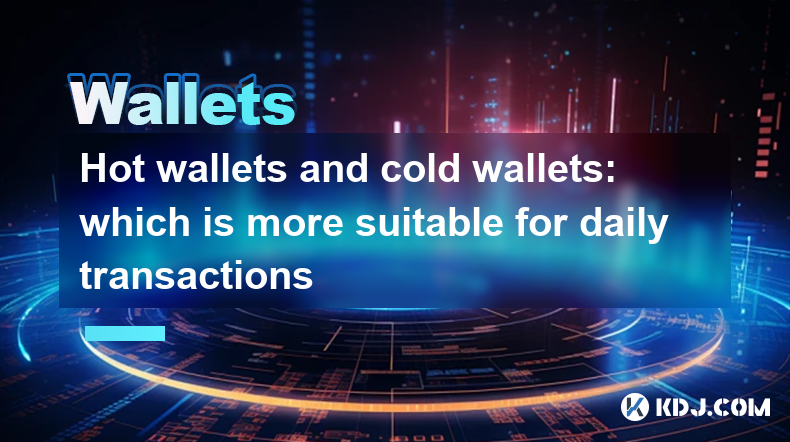
When it comes to managing cryptocurrencies for daily transactions, the choice between hot wallets and cold wallets is crucial. Hot wallets are connected to the internet and designed for frequent transactions, making them suitable for everyday use. On the other hand, cold wallets are offline storage solutions that prioritize security over convenience, making them less ideal for daily transactions. Understanding the differences between these two types of wallets can help you decide which one is more suitable for your needs.
Hot wallets, also known as online wallets, are designed to be easily accessible and convenient for daily use. They are typically software-based and can be accessed through a web browser, mobile app, or desktop application. This constant connectivity to the internet makes hot wallets more vulnerable to hacking and cyber attacks. However, their ease of use and quick transaction capabilities make them a popular choice for those who need to frequently buy, sell, or trade cryptocurrencies.
Advantages of Hot Wallets for Daily Transactions
- Quick Access: Hot wallets allow you to quickly access your funds and make transactions with just a few clicks. This is ideal for those who need to use their cryptocurrencies for daily purchases or trading.
- User-Friendly: Most hot wallets are designed with user-friendliness in mind, making them easy to set up and use, even for beginners.
- Integration with Exchanges: Many hot wallets are integrated with cryptocurrency exchanges, allowing you to seamlessly move funds between your wallet and trading platforms.
- Real-Time Updates: Hot wallets often provide real-time updates on your cryptocurrency balances and transaction history, making it easier to keep track of your funds.
Disadvantages of Hot Wallets for Daily Transactions
- Security Risks: Since hot wallets are connected to the internet, they are more susceptible to hacking and cyber attacks. This can put your funds at risk, especially if you store large amounts of cryptocurrencies in your hot wallet.
- Dependence on Third Parties: Many hot wallets are provided by third-party services, which means you have to trust these companies with the security of your funds. If the service goes down or is compromised, you could lose access to your cryptocurrencies.
- Potential for Human Error: With the ease of use comes the potential for human error. Accidental transactions or sending funds to the wrong address can result in permanent loss of your cryptocurrencies.
Cold wallets, on the other hand, are designed for long-term storage and security. They are not connected to the internet, which significantly reduces the risk of hacking and cyber attacks. Cold wallets come in various forms, including hardware wallets, paper wallets, and even offline software wallets. While they offer superior security, cold wallets are less convenient for daily transactions due to the need to physically connect them to a device or manually enter transaction details.
Advantages of Cold Wallets for Daily Transactions
- Enhanced Security: Cold wallets are offline, making them much more secure than hot wallets. This is crucial for protecting your cryptocurrencies from hacking and cyber attacks.
- Control Over Private Keys: With cold wallets, you have full control over your private keys, reducing the risk of third-party interference or theft.
- Long-Term Storage: Cold wallets are ideal for storing cryptocurrencies that you do not plan to use frequently, providing peace of mind for long-term investors.
Disadvantages of Cold Wallets for Daily Transactions
- Inconvenience: Using a cold wallet for daily transactions can be cumbersome. You need to physically connect the wallet to a device or manually enter transaction details, which can be time-consuming and less user-friendly.
- Limited Accessibility: Since cold wallets are not connected to the internet, you cannot access them remotely. This can be a significant drawback if you need to make quick transactions on the go.
- Higher Initial Cost: Some cold wallets, such as hardware wallets, can have a higher initial cost compared to free or low-cost hot wallets.
When deciding which type of wallet is more suitable for daily transactions, it's important to consider your specific needs and priorities. If you value convenience and quick access to your funds, a hot wallet may be the better choice. However, if security is your top priority and you are willing to deal with the added inconvenience, a cold wallet might be more suitable.
Balancing Convenience and Security
For many cryptocurrency users, finding a balance between convenience and security is key. One approach is to use a combination of both hot and cold wallets. You can keep a small amount of cryptocurrencies in a hot wallet for daily transactions and store the majority of your funds in a cold wallet for long-term security. This way, you can enjoy the benefits of both types of wallets while minimizing the risks.
Choosing the Right Hot Wallet for Daily Transactions
If you decide that a hot wallet is more suitable for your daily transactions, there are several factors to consider when choosing the right one:
- Security Features: Look for hot wallets that offer robust security features, such as two-factor authentication, encryption, and multi-signature support.
- Reputation and Reliability: Choose a hot wallet provided by a reputable and reliable company with a strong track record of security and customer support.
- User Interface: Opt for a hot wallet with a user-friendly interface that makes it easy to manage your transactions and track your balances.
- Compatibility: Ensure that the hot wallet is compatible with the cryptocurrencies you plan to use for daily transactions.
Popular Hot Wallets for Daily Transactions
- Coinbase Wallet: Known for its user-friendly interface and integration with the Coinbase exchange, Coinbase Wallet is a popular choice for those new to cryptocurrencies.
- MetaMask: A browser extension and mobile app, MetaMask is widely used for interacting with decentralized applications (dApps) and making transactions on the Ethereum network.
- Trust Wallet: Acquired by Binance, Trust Wallet supports a wide range of cryptocurrencies and offers a user-friendly interface for daily transactions.
Choosing the Right Cold Wallet for Daily Transactions
If you prefer the added security of a cold wallet but still need to make daily transactions, consider the following factors when choosing the right one:
- Type of Cold Wallet: Decide whether a hardware wallet, paper wallet, or offline software wallet best suits your needs.
- Security Features: Look for cold wallets that offer strong security features, such as secure chip technology, tamper-proof design, and backup options.
- Ease of Use: Choose a cold wallet that is relatively easy to use, even if it requires some manual steps for transactions.
- Compatibility: Ensure that the cold wallet supports the cryptocurrencies you plan to use for daily transactions.
Popular Cold Wallets for Daily Transactions
- Ledger Nano X: A hardware wallet that supports a wide range of cryptocurrencies and offers a user-friendly interface for managing transactions.
- Trezor Model T: Another popular hardware wallet known for its security features and compatibility with various cryptocurrencies.
- MyEtherWallet (Offline Mode): A software wallet that can be used offline for enhanced security, suitable for those who primarily use Ethereum and ERC-20 tokens.
Best Practices for Using Hot Wallets for Daily Transactions
To maximize the benefits of using a hot wallet for daily transactions while minimizing the risks, follow these best practices:
- Keep Only What You Need: Only store the amount of cryptocurrencies you need for daily transactions in your hot wallet. Transfer any excess funds to a cold wallet for long-term storage.
- Enable Security Features: Use all available security features, such as two-factor authentication and strong passwords, to protect your hot wallet.
- Regularly Update Software: Keep your hot wallet software up to date to ensure you have the latest security patches and features.
- Monitor Your Transactions: Regularly check your transaction history and balances to quickly detect any unauthorized activity.
Best Practices for Using Cold Wallets for Daily Transactions
If you choose to use a cold wallet for daily transactions, follow these best practices to maintain security and convenience:
- Use a Secure Device: Always connect your cold wallet to a secure, trusted device to minimize the risk of malware or hacking.
- Backup Your Private Keys: Regularly backup your private keys and store them in a secure, offline location to prevent loss of access to your funds.
- Verify Transaction Details: Double-check all transaction details before confirming them to avoid sending funds to the wrong address.
- Keep Your Cold Wallet Updated: If your cold wallet has firmware or software updates, apply them promptly to ensure you have the latest security features.
Common Questions About Hot Wallets and Cold Wallets for Daily Transactions
Q: Can I use a hot wallet for long-term storage of my cryptocurrencies?
A: While it is technically possible to use a hot wallet for long-term storage, it is not recommended due to the higher security risks associated with being connected to the internet. For long-term storage, a cold wallet is a much safer option.
Q: Are cold wallets completely immune to hacking?
A: Cold wallets are significantly more secure than hot wallets due to their offline nature, but they are not completely immune to hacking. Physical theft, malware on the device used to connect the cold wallet, or social engineering attacks can still pose risks.
Q: How often should I transfer funds between my hot and cold wallets?
A: The frequency of transferring funds between your hot and cold wallets depends on your transaction needs. A common practice is to transfer funds to your hot wallet as needed for daily transactions and move any remaining funds back to your cold wallet for security.
Q: Can I use both a hot wallet and a cold wallet simultaneously?
A: Yes, using both a hot wallet and a cold wallet simultaneously is a common strategy. You can keep a small amount of cryptocurrencies in your hot wallet for daily transactions and store the majority of your funds in a cold wallet for long-term security.
Q: What should I do if my hot wallet is compromised?
A: If your hot wallet is compromised, immediately transfer any remaining funds to a cold wallet or a new hot wallet. Change all associated passwords and enable any additional security measures. Report the incident to the wallet provider and consider seeking professional help to secure your other accounts.
Q: How do I choose between a hardware wallet and a paper wallet for daily transactions?
A: For daily transactions, a hardware wallet is generally more suitable than a paper wallet due to its ease of use and added security features. While paper wallets can be secure for long-term storage, they are less convenient for frequent transactions.
Disclaimer:info@kdj.com
The information provided is not trading advice. kdj.com does not assume any responsibility for any investments made based on the information provided in this article. Cryptocurrencies are highly volatile and it is highly recommended that you invest with caution after thorough research!
If you believe that the content used on this website infringes your copyright, please contact us immediately (info@kdj.com) and we will delete it promptly.
- Titan CEO Chris Chung Calls on Crypto Industry to Establish Ethical Norms Through Social Consensus
- 2025-04-06 02:20:12
- CRV Price Prediction: Bullish Preference for CRV, Citing Its Recent Rebound from a Key Support Level
- 2025-04-06 02:20:12
- Newsmax (NYSE:NMAX) IPO Priced at $10 a Share, Opens 735% Above IPO Price
- 2025-04-06 02:15:12
- Amid the ongoing Trump tariff war, the cryptocurrency market has experienced a major pullback during the last month of Quarter 1 (Q1) 2025.
- 2025-04-06 02:15:12
- With Trump's new tariff announcement coming on April 3, the crypto market reacted with fear and saw a decline.
- 2025-04-06 02:10:12
- Members of the Trump family are further cozying up to cryptocurrencies.
- 2025-04-06 02:10:12
Related knowledge
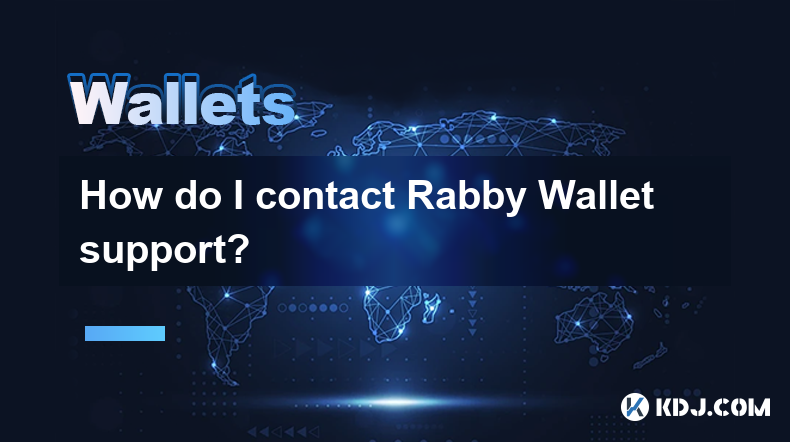
How do I contact Rabby Wallet support?
Apr 04,2025 at 08:42am
Introduction to Rabby Wallet SupportIf you are a user of Rabby Wallet and need assistance, knowing how to contact their support team is crucial. Rabby Wallet offers various methods to reach out for help, ensuring that users can get the support they need efficiently. This article will guide you through the different ways to contact Rabby Wallet support, ...
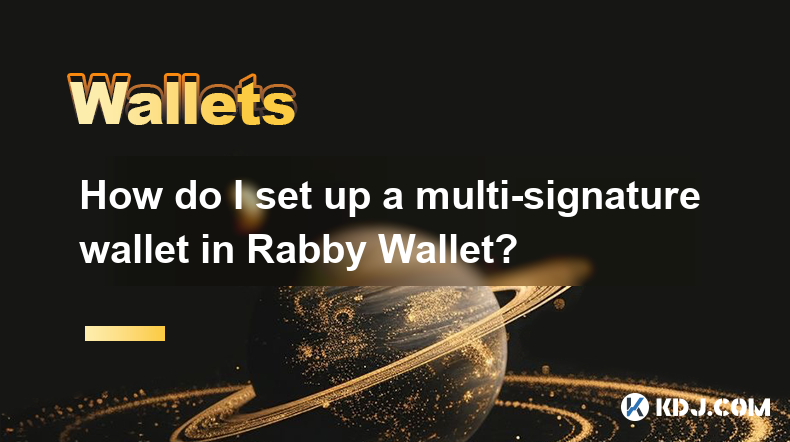
How do I set up a multi-signature wallet in Rabby Wallet?
Apr 05,2025 at 06:49pm
Setting up a multi-signature wallet in Rabby Wallet involves several detailed steps to ensure security and functionality. A multi-signature wallet requires multiple private keys to authorize a transaction, adding an extra layer of security. Here's a comprehensive guide on how to set up a multi-signature wallet in Rabby Wallet. Understanding Multi-Signat...
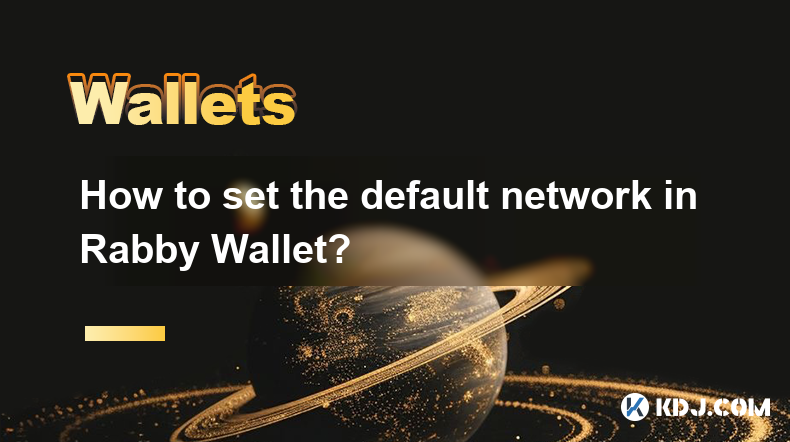
How to set the default network in Rabby Wallet?
Apr 04,2025 at 06:35am
Setting the default network in Rabby Wallet is a crucial step for users who frequently interact with different blockchain networks. This guide will walk you through the process of setting your preferred network as the default, ensuring a seamless experience when managing your cryptocurrencies. Whether you're using Ethereum, Binance Smart Chain, or any o...
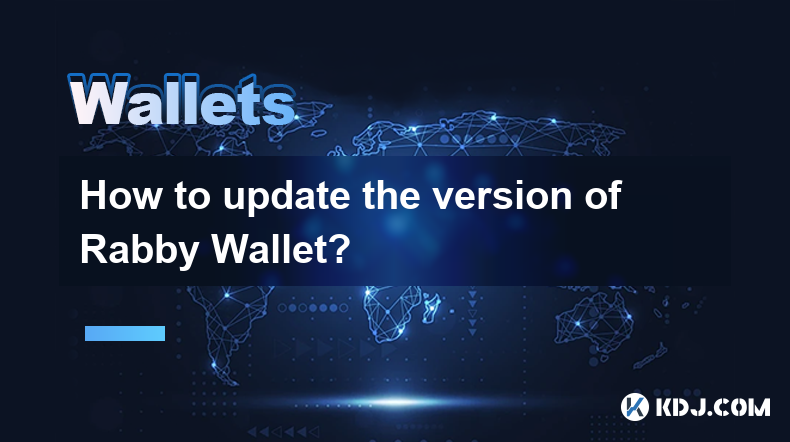
How to update the version of Rabby Wallet?
Apr 05,2025 at 02:14am
Updating the version of Rabby Wallet is an essential task to ensure you have the latest features, security enhancements, and bug fixes. This guide will walk you through the process of updating Rabby Wallet on different platforms, including desktop and mobile devices. Let's dive into the detailed steps for each platform. Updating Rabby Wallet on DesktopU...
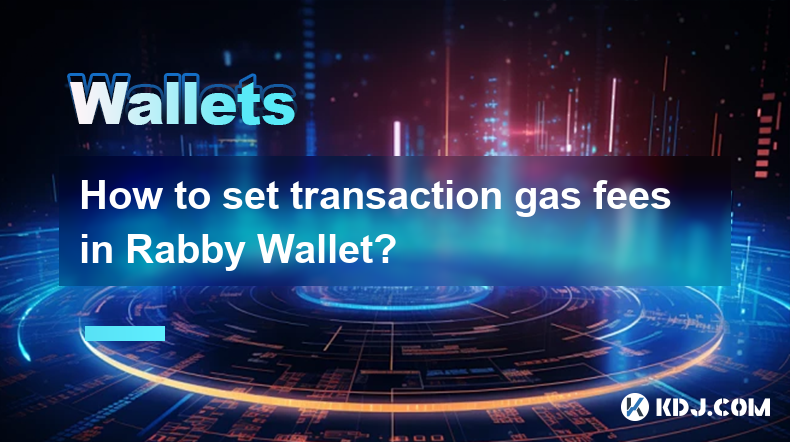
How to set transaction gas fees in Rabby Wallet?
Apr 05,2025 at 02:29pm
How to set transaction gas fees in Rabby Wallet?Rabby Wallet is a versatile tool for managing cryptocurrency transactions, offering users the flexibility to customize gas fees according to their preferences. Setting the right transaction gas fees is crucial for ensuring your transactions are processed efficiently and economically. This guide will walk y...
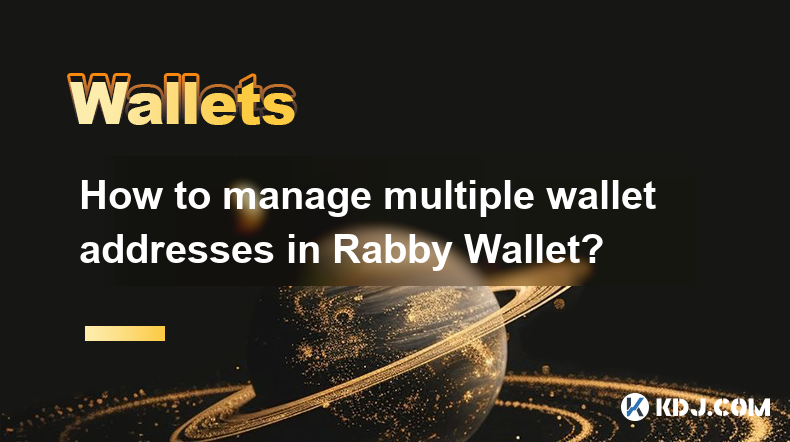
How to manage multiple wallet addresses in Rabby Wallet?
Apr 05,2025 at 07:14am
Managing multiple wallet addresses in Rabby Wallet can significantly enhance your cryptocurrency management experience. Whether you're a seasoned crypto enthusiast or a beginner, understanding how to efficiently handle multiple addresses can streamline your transactions and improve your security. In this article, we will explore the detailed steps and b...

How do I contact Rabby Wallet support?
Apr 04,2025 at 08:42am
Introduction to Rabby Wallet SupportIf you are a user of Rabby Wallet and need assistance, knowing how to contact their support team is crucial. Rabby Wallet offers various methods to reach out for help, ensuring that users can get the support they need efficiently. This article will guide you through the different ways to contact Rabby Wallet support, ...

How do I set up a multi-signature wallet in Rabby Wallet?
Apr 05,2025 at 06:49pm
Setting up a multi-signature wallet in Rabby Wallet involves several detailed steps to ensure security and functionality. A multi-signature wallet requires multiple private keys to authorize a transaction, adding an extra layer of security. Here's a comprehensive guide on how to set up a multi-signature wallet in Rabby Wallet. Understanding Multi-Signat...

How to set the default network in Rabby Wallet?
Apr 04,2025 at 06:35am
Setting the default network in Rabby Wallet is a crucial step for users who frequently interact with different blockchain networks. This guide will walk you through the process of setting your preferred network as the default, ensuring a seamless experience when managing your cryptocurrencies. Whether you're using Ethereum, Binance Smart Chain, or any o...

How to update the version of Rabby Wallet?
Apr 05,2025 at 02:14am
Updating the version of Rabby Wallet is an essential task to ensure you have the latest features, security enhancements, and bug fixes. This guide will walk you through the process of updating Rabby Wallet on different platforms, including desktop and mobile devices. Let's dive into the detailed steps for each platform. Updating Rabby Wallet on DesktopU...

How to set transaction gas fees in Rabby Wallet?
Apr 05,2025 at 02:29pm
How to set transaction gas fees in Rabby Wallet?Rabby Wallet is a versatile tool for managing cryptocurrency transactions, offering users the flexibility to customize gas fees according to their preferences. Setting the right transaction gas fees is crucial for ensuring your transactions are processed efficiently and economically. This guide will walk y...

How to manage multiple wallet addresses in Rabby Wallet?
Apr 05,2025 at 07:14am
Managing multiple wallet addresses in Rabby Wallet can significantly enhance your cryptocurrency management experience. Whether you're a seasoned crypto enthusiast or a beginner, understanding how to efficiently handle multiple addresses can streamline your transactions and improve your security. In this article, we will explore the detailed steps and b...
See all articles





















































































